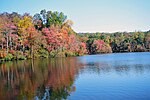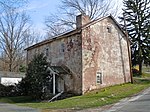Hopewell Furnace National Historic Site in southeastern
Berks County, near Elverson, Pennsylvania,
is an example of an American 19th century rural iron plantation, whose operations were
based around a charcoal-fired cold-blast iron blast furnace.
The significant restored structures include the furnace group
(blast furnace, water wheel, blast machinery, cast house and charcoal house), as well as the ironmaster's house, a company store, the blacksmith's shop, a barn and several worker's houses.
Hopewell Furnace was founded about 1771 by ironmaster Mark Bird, son of William Bird, who had been one of Pennsylvania's most prominent ironmasters. The site's most prosperous time was during the 1820-1840 period with a brief return to significant production during the American Civil War. In the mid-19th century, changes in iron making, including a shift from charcoal-fueled furnaces to anthracite-fueled steel mills, rendered smaller furnaces like Hopewell obsolete. The site discontinued operations in 1883.
In 1938, the property was designated Hopewell Village
National Historic Site under the authority of the Historic Sites Act, thereby becoming one of the
earliest cultural units of the National Park System.
Today, Hopewell Furnace consists of 14 restored structures, 52 features on the List of Classified Structures, and a total of 848 mostly wooded acres. Hopewell Furnace National Historic Site is located in the Hopewell Big Woods and bordered by French Creek State Park on three sides and State Game Lands 43 on the south side, which preserves the lands the furnace utilized for its natural resources.








